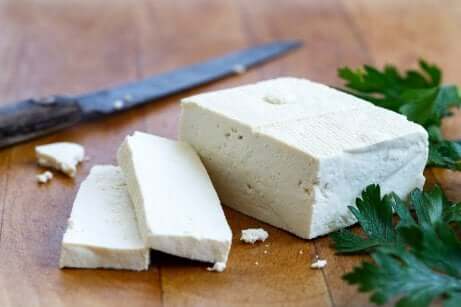How Much Cheese Can We Eat a Day?


Written and verified by the nutritionist Anna Vilarrasa
A lot of cheese-lovers may wonder, “How much cheese can we eat a day?”
After all, cheese is a caloric food. It’s rich in cholesterol and it has a lot of saturated fats. As a result, many people eliminate it from their diets.
However, anything is OK in moderation. Let’s take a look at cheese.
What components does cheese have?
Cheese is a food that’s made from milk and it’s been part of the human diet for millions of years. First, the milk is curdled, then ferments are added and it’s left to ripen. Depending on the type of milk, the ferments used and the degree of maturation, we are left with different varieties of cheeses.
The main nutritional components of cheese are:
- Vitamins A, D, and B12
- Minerals such as calcium, phosphorus, zinc, and magnesium
- Proteins of high biological value, with all the essential amino acids
- Saturated fat and cholesterol
However, we have to keep in mind that the concentration of nutrients changes depending on the type of cheese we’re talking about.
The more cured the cheese is, the less water it contains. As a result, it has a higher concentration of nutrients: it has more vitamins and minerals, but it also has more cholesterol and fat.
The main fear of eating cheese: Calories and fat
It’s true that cheese is a food that’s rich in calories and that most cheeses contain cholesterol and saturated fat. Because of that, many people have decided to eliminate it from their diets when they want to lose weight. Also, people tend to stop eating it if they have high cholesterol.
People who want to lose weight or who need to watch their diet for whatever reason should talk to their doctor or nutritionist. That’s because changes in diet should be discussed with your doctor, just like with anything else that concerns your health.
However, it is necessary to evaluate foods as a whole and to stop focusing on just a few particular nutrients. In recent years, new scientific evidence has provided data on eating cheese. And, this information has made us rethink how much cheese we can eat per day.

What does science say about it?
In 2019, the Advances in Nutrition magazine published an article reviewing new scientific evidence about the consumption of cheese and dairy products. Also, it looked at its relationship with different health concerns. The conclusions were:
“Full-fat dairy products (whole milk, whole yogurt, cheese) don’t have negative side effects on insulin sensitivity, blood lipid profile and blood pressure, despite their saturated fat and sodium content.”
Also, it said:
“Daily salt consumption should be controlled by those with chronic kidney failure or nephrotic syndrome. And, although it seems like it doesn’t have much influence on blood pressure, people with high blood pressure should still talk to their doctor.”
In the same publication, another article stated:
“Dairy products, including cheese, promote better health when consumed in moderation. Eating fermented dairy products, such as cheese or yogurt, is associated with a moderately lower risk of mortality from cardiovascular disease.”
How much cheese can we eat a day?
Although we can eat cheese daily, it’s important to know that cheese isn’t a fundamental food in our diets. Therefore, we can’t equate it with vegetables, legumes, fruits, or eggs, not even as a source of vitamins or calcium. So, it’s not a food that we should be eating whenever we want.
Even though nothing happens if we remove the cheese from our diets, eating the recommended amounts of it shouldn’t cause health problems.
As with most foods, the answer to how much cheese we can eat per day is “it depends.” Individualized dietary recommendations are always stricter than general ones. However, we can establish a guideline and acceptable amount.
When it comes to soft and cured cheeses or those that are more mature, the recommended serving is between 40 and 50 grams a day. This is equivalent to about two wedges or slices since each one weighs about 20 grams.
If we’re talking about fresh cheeses, you can eat up to 100 grams a day. This is the case with mozzarella, cottage cheese, quark, or mascarpone. This equates to about a half-cup. Fresh cheese is usually marketed in small portions of about 75 grams each. So, you can use that measure as a reference.

Keep reading: 5 Foods that Fight and Eliminate Saturated Fat
Tips for eating cheese in a healthy manner
- Prioritize traditional cheeses. What do we mean by traditional? When it comes to cheese, we’re talking about those that are made with the basic ingredients: milk, dairy ferments, salt, and rennet. Some of these are edam, camembert, feta, manchego, goat cheese, brie, and gorgonzola.
- You don’t have to choose fat-free or light cheeses. If you want to reduce your fat intake, you can eat cottage cheese or fresh cheeses that naturally have less fat because they contain more water.
- Be careful with processed cheeses that are specially made for melting, individually packaged, or cheeses that are used as a spread. They are often made with other minor ingredients such as milk protein, butter, and starches.
- The cheeses with the most sodium are Roquefort, parmesan, bleu cheese, gouda, and camembert. It’s important to not eat too much of them so you don’t increase your daily sodium intake to an amount that’s well above the recommended amount in modern diets.
So, when we’re talking about cheese, we can say that, although it’s not essential or a priority food, it’s also not the enemy of a healthy diet.
Take care of your diet by keeping it varied and balanced!
All cited sources were thoroughly reviewed by our team to ensure their quality, reliability, currency, and validity. The bibliography of this article was considered reliable and of academic or scientific accuracy.
- Arne, A et al. Effects of full-fat and fermented dairy products on cardio metabolic disease: foods is more than the sume of its parts. Advances in Nutrition. Setiembre 2019. 10(5) : 924S-930S.
- Australian Dietary Guidelines. Australian Government. National Health and Medical Research Council. Department of Health and Ageing. 2013.
- Guo-chon, Ch, et al. Cheese consumption and risk of cardiovascular disease: a meta-analysis of prospective studies. European Journal of Nutrition. Diciembre 2017. 56(8): 2565-2575.
- Hjerpsted J. Cheese intake in large amounts lowers LDL-cholesterol concentrations compared with butter intake of equal fat content. American Journal of Nutrition. Diciembre 2011. 94(6): 1479-84.
- Mozaffarian D. Dairy foods, obesity and metabolic health: the role of food matrix compared with single nutrients. Advances in Nutrition. Setiembre 2019. 10(5) : 917S-923S.
This text is provided for informational purposes only and does not replace consultation with a professional. If in doubt, consult your specialist.








